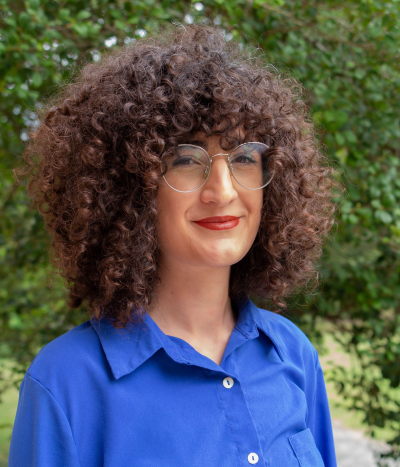Interviewed by Zeena Yasmine Fuleihan, PhD Candidate (Literature)

The Gender, Sexuality, and Feminist Studies department is excited to welcome Paniz Musawi Natanzi as a 2022–2023 postdoctoral associate in the theme-year of Feminist Theory and Imperialism. As a Literature PhD student completing certificates in both Gender, Sexuality, and Feminist Studies and Middle East Studies, I am grateful to have had a chance to sit down with Paniz over coffee, as many of her research interests converge along similar lines as my own. As we chatted about how we negotiate our relationships to disciplines such as area studies and critical theory, I resonated with Paniz’s suggestion that “while there are limits to what we can decolonize, we can intervene with decolonial feminist and queer theories.” Below is our conversation about her academic work and her plans for the upcoming year.
Tell me about your academic background and research interests—where has your research taken you and what are its central concerns?
I came to a PhD in Gender Studies at SOAS (School of Oriental and African Studies), University of London, by way of a BA in Political Science from the Free University of Berlin – and a term abroad at the American University of Beirut - and a MSc in Comparative Political Thought from SOAS. I am invested in understanding analytical and material as well as embodied and experiential dimensions of knowledge, labor and im/mobility in the context of war and imperialism through empirical research and political theories. I am particularly interested in how these matters manifest in the field of visual art production in modern and contemporary Afghanistan. I consider artists as laborers in local, national, trans-Asian and imperialist circuits of visual arts and who navigate through spatio-temporal configurations of culture in Afghanistan’s last four decades of war.
In my dissertation I studied visual arts in Kabul in the war mode of production and treated Kabul as a miniature model of geopolitical power and violence configurations. I investigated how men artists navigated gender, race and class relations in visual art workplaces in a Kabul governed by the urban manifestations of war, neoliberal economic policies and liberal political (re)construction and a nominally sovereign state. In my situated analysis of men’s artworks, and in conversation with the spatial and thematic dimension of women’s artistic labor, I studied the art mediums and analyzed reoccurring subjects in contemporary art approaches. At the same time, any war economy reconfigures the hegemonic conceptual approach to cultural (geo)politics, which in turn reshapes visual arts, including what is visible, what more easily circulates, and what becomes valorized and by which actors. Following the US-led NATO invasion of Afghanistan in 2001, visual arts that were “made in Afghanistan” became a site of interest to foreign state and non-state actors in capitalist democracies. Predominantly, the UK, US and European member states, and non-state private actors proliferated their ideas of culture, in this case visual artists and artworks with a form of value, through infrastructures of neoliberal capitalism.
What brought you to the postdoc at Duke, and what are your plans for the year?
I worked and lived in Afghanistan from 2019 until late July 2021. The US-led NATO military occupation of Afghanistan ended with the formal finalization of the Taliban take-over of Afghanistan in August 2021, but capitalist democracies’ system of financial and economic imperialism prevails. I continued to work as a researcher and activist in Germany in support of Afghan/istanis. The call for proposals for the position of a post-doctoral associate in the theme-year on Feminist Theory and Imperialism led by the trailblazing Professors Frances Hasso and Anna Krylova brought me to Duke. This is a unique opportunity attached to a fall doctoral/postdoctoral/faculty seminar. The fellowship provides the space and resources for me to work on my research, publications and share my works in progress with academic and wider audiences in different publication formats. In spring term I will teach “Global Politics and Masculinities.”
I will continue writing my book manuscript, which considers the war mode of visual art production through visual art laborers in Afghanistan during the War on Terror and situates it into Afghanistan’s modern history of cultural (geo)politics in consecutive wars. I am also thinking about how the defeat of NATO forces in 2021 transformed the lives of artists I have accompanied since 2015. Some now live under the Taliban in Afghanistan, others have fled to Pakistan and Iran, some have been evacuated to member states of the European Union or the UK, Australia and the US and some I cannot reach. As I write the book manuscript in such conditions, I am considering what I can and cannot and should and should not tell.
How has your experience at Duke been so far?
Busy, deeply empowering and inspiring. I am very grateful for the incredibly precious mentorship I receive at the Gender, Sexuality and Feminist Studies Program at Duke and the brilliant and kind people I am getting to know across campus.